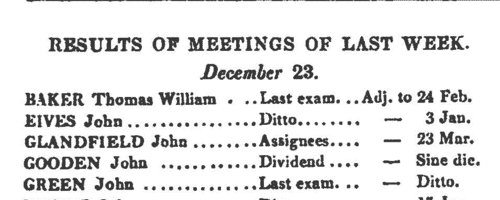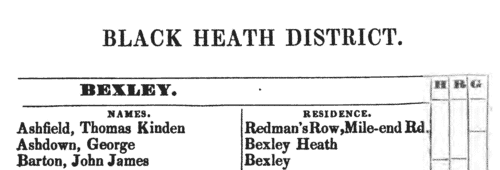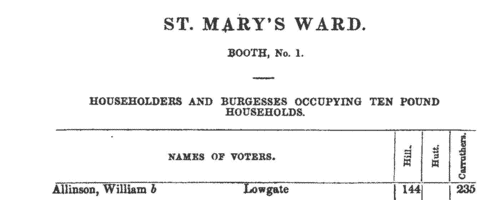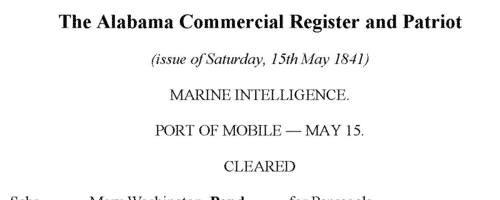Post Surname Ancestry ResultsOur indexes 1000-1999 include entries for the spelling 'post'. In the period you have requested, we have the following 121 records (displaying 61 to 70): Single Surname Subscription | | | Buying all 121 results of this search individually would cost £654.00. But you can have free access to all 121 records for a year, to view, to save and print, for £100. Save £554.00. More... |
These sample scans are from the original record. You will get scans of the full pages or articles where the surname you searched for has been found. Your web browser may prevent the sample windows from opening; in this case please change your browser settings to allow pop-up windows from this site. Deaths, Marriages, Bankrupts, Dividends and Patents
(1819-1820)
Death notices and obituaries, marriage and birth notices, bankrupts and dividends, and patents, as reported in the Monthly Magazine or British Register. Includes some marriages and deaths from Ireland, Scotland and abroad.
POST. Cost: £6.00.  | Sample scan, click to enlarge

| Masters of Merchantmen
(1822)
The Society for the Registry of Shipping was instituted in 1760, and published an annual register and supplement. The annual register consisted of an alphabetical list of ships surveyed for insurance in Britain and Ireland, together with an alphabetical supplement. The society maintained a Registry Office at which alterations and additions were notified, and members delivering their registers when called for had them updated and returned on the following or the ensuing day. Each ship was given a number within each letter of the alphabet: ships' names were not unique, so within each name a ship was identified by the name of the captain or master at the time of the last survey. Then abbreviations indicate the type of vessel (Bg, brig; Bk, barque; Cr, cutter; Dr, dogger; G, galliott; H, hoy; K, ketch; S, ship; Sk, smack; Sp, sloop; Sr, schooner; St, schoot; Sw, snow), and whether sheathed (s) and/or doubled (d) with copper (C) and iron bolts (I B) or over boards (W & C), patent felt (P F), copper fastened (c f), copper bolted (c b), or copper repaired (C rp) sometimes with a date, such as (18)18. The third column, reserved for masters' names, is not particularly wide; with short surnames, an initial will be given; but longer surnames omit the initials, and even longer surnames are abbreviated. It will be borne in mind that these are the names of the masters not (necessarily) in 1822, but at the time of the last survey. Often new masters had been appointed by the time of re-survey, and their names are added in slightly smaller type under the original master's names in the third column. In the fourth column is the tonnage: where there is a blank under the number this indicates that the ship had two decks; more often the letters S D (B) for single deck (with beams); D W for deep waist; S D W single deck with deep waist; B D W single deck with beams and deep waist. Underneath the entry may run references to recent repairs: Cl. clincher built; Drp. damages repaired; grp. good repair; len. lengthened; lrp. large repair; N. (new) B. bottom, D. deck, Kl. keel, Sds. sides or UW. upper-works; rb. rebuilt; rsd. raised; Srprs. some repairs; or trp. thorough repair. In italics, the timber of the ship is described - B. B., black birch; C., cedar; H., hazel; Hk., hackmetack; J., juniper; L. O., live oak; M., mahogany; P., pine; P. P., pitch pine; S., spruce; W. H., witch hazel; W. O., white oak. The fifth column gives the place that the ship was built. For foreign ships this may be as vague as 'Dutch' or 'French'; but nothing in this record specifically indicates the nationality of ship, master or owners, except that an A. under the owner's name indicates that the vessel was American property. The sixth column gives the year of the ship's age; a few were still sailing after 30 or 40 years. The seventh column gives the owner's name, abbreviated in the same way as the master's name. Where the master was the owner, the word Capt. will appear. With vessels owned abroad, the name in this column is sometimes that of the port of origin, not the surname of the owner. Where there has been a change of owner by the time of re-survey, the new name is put underneath in smaller type. The printer sought to avoid confusion by aligning names of ports to the left and surnames to the right, but that leaves longer names doubtful. The eighth column gives the feet of the draught of water when loaded. The ninth column shows the destined voyage for which the survey took place, with the port of survey abbreviated (Be., Belfast; Br., Bristol; Co., Cork; Cs, Cowes; Da., Dartmouth; Du., Dublin; Eh, Exmouth; Ex., Exeter; Fa., Falmouth; Gr., Greenock; Hl, Hull; Hn, Harrington; La., Lancaster; Lh, Leith; Li., Liverpool; Lo., London; Ly., Lynn; Mt., Maryport; Po., Poole; Ph, Portsmouth; Pl., Plymouth; Sc., Star-Cross; Tn., Teignmouth; Tp., Topsham; Wa., Waterford; Wn, Whitehaven; Wo., Workington; Ya., Yarmouth), and the letter C where the vessel was a constant trader between the two ports. The tenth column gives the classification of the vessel (A, first; E, second) and its stores (1, first; 2, second) and the year of survey, e. g. 09 for 1809, or, if surveyed during 1821, the month, e. g. 3 for March. Where the vessel has been re-surveyed, the classification letter and number will be repeated or revised in the final column. The sample scan is from the main list. This is the index to masters in the main list and the supplement.POST. Cost: £6.00.  | Sample scan, click to enlarge

| Bankrupts in London
(1824)
English bankrupts could be dealt with in the provinces (Country) or London (Town). Town proceedings covered not only London but many provincial cases. The weekly Law Advertiser printed this London Bankrupt Diary, detailing the progress of Town cases as they went through the various stages of hearings towards the surrender, realisation and distribution of the bankrupt's assets.POST. Cost: £6.00.  | Sample scan, click to enlarge

| London Bankruptcy Proceedings
(1824)
English bankrupts could be dealt with in the provinces (Country) or London (Town). Town proceedings covered not only London but many provincial cases. The weekly Law Advertiser included this section entitled Results of Last Week's Meetings, giving date, name (surname first, in capitals), stage of the process (such as last examination, appointment of assignees, dividend) and the prospective date of the next meeting (sine die when the case was, effectively, closed).POST. Cost: £6.00.  | Sample scan, click to enlarge

| Bankrupts' Assignees
(1827)
Assignees of bankrupts' estates (usually principal creditors and/or close relatives of the bankrupt)POST. Cost: £6.00.  | Sample scan, click to enlarge

| Electors in East Farleigh
(1835)
A poll to elect knights of the shire to represent the Western Division of the county of Kent in parliament was held in 1835, the candidates being Thomas Law Hodges (H), Thomas Rider (R) and sir William R. P. Geary (G). The poll started on January 19th; Rider withdrawing his name on that first day, the poll was closed prematurely, many electors not yet having voted. This poll book lists all the electors, whether they voted or not; the county franchise included not only male freeholders of 40s a year, but also £10 copyholders and long-leaseholders, and £50 short-leaseholders and tenants. For each elector the full name is given (surname first) and residence (often not the place for which qualified to vote). Votes are indicated by dashes in the right-hand columns. POST. Cost: £4.00.  | Sample scan, click to enlarge

| Electors in Sutton, Southcoates, Drypool, &c.
(1835)
A poll was taken 6 and 7 January 1835 for the election of members to serve in Parliament for the borough of Kingston-upon-Hull, the candidates being Matthew Davenport Hill, William Hutt and David Carruthers. This poll book lists all the electors in the wards of Hull (St Mary's, North, Trinity, Whitefriar, Humber, Austin, and South Myton), in Sculcoates, and in Sutton, Southcoates, Drypool &c. In each ward the names are arranged in five sections: Householders and Burgesses occupying Ten Pound Households; Burgesses not occupying Ten Pound Households; Unpolled Voters residing in the ward; Unpolled Freemen; and Non-Resident Freemen not polling. There are also short lists of votes that were tendered but the validity of which remained uncertain. In all cases full names and addresses are given: where electors voted, their votes are indicated in the right-hand columns, the numbers shown there being their numbers in the cumulating totals for each candidate. After the name of each voter there is an italic a or b showing whether he voted on the first or second day. POST. Cost: £4.00.  | Sample scan, click to enlarge

| British Guiana Slave Owners (1838)
Slavery was abolished throughout the British Empire by act of Parliament in 1833. This list, published in 1838, gives details of compensation paid to owners who had suffered by the emancipation of their slaves after abolition. The table gives the date of the award, the number of the claim, the full name of the party to whom payment was awarded, the number of slaves, and the sum paid. Some masters had owned more than 100 slaves; most of the claimants had only a few. The cost of the loss of a single slave was generally assessed here at as much as £63. There were 2668 claims from British Guiana, including some that were abandoned, disallowed, or still unsettled because of litigation.
POST. Cost: £8.00.  | Sample scan, click to enlarge

| London aldermen, councillors, officers and officials
(1841)
The Royal Kalendar lists the mayor and aldermen of the city of London, annotated with ward, year of election, and address; deputies and common-council men of the city, by ward, with the names of their respective livery companies; the city officers; officials of the Irish Society; Commissioners of Sewers, Lamps and Pavements; the Royal Exchange and Gresham Trust Committee; Gresham College; City of London School; the Commissioners of the Lieutenancy for the London; magistrates and clerks of the London police offices; and officials of the Honourable Artillery Company; and commissioners and officials of the Office of the Metropolitan Roads north of the Thames. Then, gathered together until the title of Miscellaneous Institutions, are the Metropolitan Commissioners in Lunacy; the Scottish Corporation for the Relief of Natives of Scotland who have acquired no Parochial Settlement; Morden College for Decayed Merchants; the Alfred Society; the Travellers' Society; the Grand Lodge of Freemasons of England; Royal Freemasons School; Royal Masonic Institution; Society of Ancient Britons; Royal Humane Society; Mile End Philanthropic Society; Society for the Relief of Distressed Widows; City of London General Pension Society; Society for the Discharge and Relief of Persons Imprisoned for Small Debts; Friendly Female Society for Relieving Poor, Infirm and Aged Widows and Single Women, of Good Character, who have Seen Better Days; Society of Friends of Foreigners in Distress; London Female Penitentiary; Patriotic Fund; Corporation of the Refuge for the Destitute; Society for the Improvement of Prison Discipline and for the Reformation of Juvenile Offenders; Guardian Society for the Preservation of Public Morals; Society for the Suppression of Mendicity; Medical Benevolent Society; British and Foreign Anti-Slavery Society; and the General Cemetery Company.POST. Cost: £6.00.  | Sample scan, click to enlarge

| Masters of Merchantmen at Mobile, Alabama (1841)
The custom house at Mobile, Alabama, issued daily reports of the arrivals and clearing of merchantmen. The lists give the type and name of vessel, surname of master, whence arrived or whither departed, and the name of the shipper. Most of the trade was with American ports and Britain. These abbreviations are commonly used: Ar, arrived; Br, British; fm, from; Schr, schooner. May 1841
POST. Cost: £8.00.  | Sample scan, click to enlarge

|
Research your ancestry, family history, genealogy and one-name study by direct access to original records and archives indexed by surname.
|












